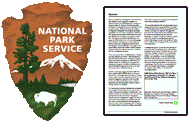United States National Park Service

United States National Park Service: Publications
Date of this Version
10-2014
Citation
Natural Resource Report NPS/NGPN/NRR—2014/868.1 / NPS 960/127008, October 2014: xix, 95 pages
Published by the United States Department of the Interior. National Park Service. Natural Resource Stewardship and Science. Fort Collins, Colorado
Also available at: http://science.nature.nps.gov/im/units/ngpn/
http://www.nature.nps.gov/publications/nrpm/
Please cite this publication as:
Wilson, M. H. and S. K. Wilson. 2014. Water quality monitoring protocol for wadeable streams and rivers in the Northern Great Plains Network: Standard operating procedures version 1.0. Natural Resource Report NPS/NGPN/NRR—2014/868.1. National Park Service, Fort Collins, Colorado.
Abstract
Executive Summary
The Water Quality Monitoring Protocol includes two parts: a Narrative and the Standard Operating Procedures (SOPs). The Water Quality Monitoring Protocol Narrative Version 1.0 describes a general overview of the status of water resources throughout the parks in the National Park Service’s Northern Great Plains Network (NGPN), the objectives, the field methods, and the sampling design selected for this long-term monitoring program. This report includes the detailed SOPs for the NGPN’s Water Quality Monitoring Protocol. All water quality monitoring is conducted by the United States Geological Survey (USGS) through Interagency Agreements. The USGS North Dakota Water Science Center (WSC) monitors water quality at Knife River Indian Villages National Historic Site and Theodore Roosevelt National Park. The USGS Wyoming WSC monitors water quality at Devils Tower National Monument, Fort Laramie National Historic Site, and Agate Fossil Beds National Monument. The USGS Nebraska WSC monitors water quality at Niobrara National Scenic River and Missouri National Recreational River. The basis for the field-oriented SOPs (#3 and #4) comes from the USGS National Field Manual for the Collection of Water-Quality Data (http://pubs.water.usgs.gov/twri9A) as well as other USGS reports. The remainder of the more administrative SOPs outline step by step procedures for NGPN staff to follow to accomplish the long-term monitoring program.
Included in
Environmental Education Commons, Environmental Policy Commons, Environmental Studies Commons, Fire Science and Firefighting Commons, Hydrology Commons, Leisure Studies Commons, Natural Resource Economics Commons, Natural Resources Management and Policy Commons, Nature and Society Relations Commons, Other Environmental Sciences Commons, Physical and Environmental Geography Commons, Public Administration Commons, Recreation, Parks and Tourism Administration Commons


Comments
United States government work. Public domain material.